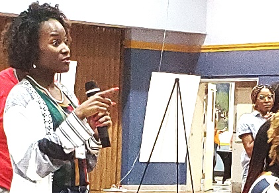
By Christopher Young,
Contributing Writer,

Approximately 150 concerned citizens, educators, students, community organizers, and leaders gathered at M.W. Stringer Grand Lodge, 1072 W JR Lynch St. Jackson, Mississippi Saturday, July 26, 2025, from 10am – 3 pm to discuss the future of public education in a state that increasingly looks to expand school-choice – a carve-out to public education. Their names vary – private schools, charter schools, independent schools, voucher schools, liberty schools, academies, etc. Unlike in decades past, there is energy every year now to pass legislation that would fund private schooling with public dollars.
The convening, organized by One Voice Mississippi, a non-profit, civic engagement organization working to give voice to marginalized and vulnerable communities across the South by democratizing public policy through research, training, education, and organizing communities. There were numerous slides presented with data points including, presidential orders and federal policy impacts on Mississippi, a breakdown on Mississippi’s Health and Human Services grants, U.S. Department of Education federal grants to Mississippi, federal funds as a percent of school district budgets, and impacts of the Big Beautiful Bill on Mississippi education.
Of particular importance when considering federal support for education and other areas is that Mississippi is well-known as a generational debtor-state. We take nearly 50 percent of our annual revenues in one way or another from the federal government. Currently, only West Virginia takes more than Mississippi, and New Mexico is a close third.
This convening reminded us that when the federal government freezes funding, grants, or reduces funding, Mississippi is left in a horrible place. Our poor fiscal leadership, decisions like turning down millions for feeding programs for poor children – in the poorest state in the nation, prematurely pulling out of a federal rental assistance program and returning $130 million to the federal government, and recently deciding to eliminate the state income tax, are things that cement Mississippi at the bottom.

Photo by Christopher Young
The audience was shown charts reflecting that in 2024, on the health and human services front, Mississippi received less than $257,000 for Head Start, and less than $103,000 for Child Care and Development Block Grants. Based on President Donald Trump Administration’s Executive Orders, those funds will be reduced and even if it had the will, the Mississippi Legislature cannot make up the difference. On the education side, career and technical education state grants total less than $16,000, rural and low-income schools program less than $7,000, and special education pre-school grants are less than $5,000. Once again, God only knows what they will be next year and the year after.
Striving to attain educational equity, as presenter Kayle Amos put it, “where every child in Mississippi is equally served,” led One Voice to engage with communities across the state through an extensive survey process. They presented findings that reflect that some school districts are receiving just 10.8 percent of the federal funding, whereas others are receiving 46.4 percent. Only three counties could not be engaged, mostly due to the March 2023 tornado that devastated Rolling Fork and surrounding areas.
The five highest areas of concern that were illuminated by the surveys were, 1) staffing and teacher Support are widespread needs, 2) funding and resource equity remains a key barrier to opportunity, 3) community and family engagement is seen as a critical component of trust-building and collective success, 4) mental health and holistic supports are called for as pillars of safe and supportive schools, and 5) special education support is inconsistent and often insufficient across districts.
Participants had a chance, after hearing from a diverse array of perspectives including, the student panel (pictured above), policy analyst Christin Calloway, and audience members like Julian Miller – a Senior Supervising Attorney at Southern Poverty Law Center, Tawanna McFarlin – a dynamic change agent, strategist, and business owner with Mississippi Gulf Coast roots, and others weighed in. Small group discussions focused on: 1) which of the previously identified needs you see in your locality, 2) what do you resonate most with in terms of your own observations or experiences, and 3) what you consider to be the most urgent needs to address.
One Voice intends to focus resources in all areas, yet in terms of priorities, the convening shifted the top three to 1) Mental Health and Holistic Supports, 2) Community and Family Engagement, and 3) Funding and Resource Equity. Now they will bring their resources and expertise to bear in continuing as a catalyst for change.
One Voice always brings it – great content, great meal, comfortable environment, and welcoming atmosphere. Of note, One Voice’s founder and current NAACP President and Chief Executive Officer Derrick Johnson, who resides in Jackson, was on hand for much of the event. With responsibilities like his, we can only imagine what his calendar looks like, yet there he was. His presence was a wonderful compliment to the familiar call and response used throughout the convening – Who Protects the Village? We Protect the Village!

Be the first to comment